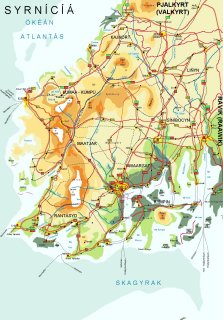Surnichia is a nation in southwestern Scandinavia. It has over 10 million inhabitants on an area of around 160,000 square kilometres. More than three quarters of the population lives in cities, of which the capital, Jelnur, is the largest (with almost 2 million inhabitants). The Surnichian landscape is characterized by mountain ranges covered with glaciers and crossed by deep fjords in the west, and by forested hills in the east. The country's wonderful nature is honoured by the people of Surnichia, and is protected by the government.
Surnichia was founded in 2153 in the area that was declared uninhabitable by the international authorities in 2104. This declaration came after the majority of the original population - mainly Norwegians and Swedes - had sought refuge within the United States of Europe. Finns and Sami people who had fled westward due to the Russian invasion in Finland, together with A small number of Norwegians, who had not left their country to build a new life in Greater Europe, established new communities in Scandinavia, some of which were later united in what is now Surnichia. Before the nation's founding, the construction of its later capital, Jelnur, on the remains of the abandoned Norwegian town of Seljord, had already started.
During the first 50 years of its existence, Surnichia was governed by an aristocrat group, but after fierce uprisings the Republic was proclaimed in 2203. Together with two other young Scandinavian states, Raawik and Valkurt, Surnichia founded the Skandínávísk Ékónómískás oc Pólítískás Fjerbynd (SEPF), the Scandinavian Economic and Political Association. Outside this association, Surnichia did not wish to entertain any relations with other countries. During the fifth and the sixth World War, Surnichia remained neutral. Until recently, the nation's reserved attitude had lead to a situation in which little was known about Surnichia in the rest of the world. The country was avoiding foreign press and tourists. This situation changed when in 2261 a Surnichian citizen who had lived in Amsterdam for a long time became president. President Veierhaven stands for a more open relationship with the outside world, and he also initiated a tourist industry. Still, the country is hesitant in entering into far-reaching international cooperation, and sticks to strict border controls.
| Official name: | Répýblíká Syrnícíá |
| Location: | Northern Europe |
| Area: | 161,000 km2 |
| Longest distance from north to south: | 522 km |
| Longest distance from east to west: | 454 km |
| Highest point: | Akló, 3480 m |
| Lowest point: | sea level |
| Longest river: | Grýná, 458 km |
| Largest islands: | Hirtř, Nésřs, Karmyj-islands, Líndes, Nes, Áryndel, Rympin, Skín, Lídýró Skín, Tyrn, Larn, Larvik, Lídýró Larvik, Kráqřryý, Lídýró Kráqřryý |
| Coastline: | Atlantic Ocean 454 km, North Sea 681 km, Skagerrak 1051 km |
| Land boundaries: | Valkurt 312 km, Raawik 436 km |
| Government type: | Republic (29 October 2203) |
| Form of government: | Parliamentary Democracy (2203) |
| Suffrage: | common from 18 years (since 2203) |
| Currency: | ficsa (fiqsá); 1 ficsa = 100 torul (tooryl); 1 ficsa = € 0.88; 1 euro = đ 1.14 |
| Number of inhabitants: | 10,100,000 (2261) |
| Population density: | 60 per km2 |
| Urban population: | 76 % |
| Capital: | Jelnur (Jelnyr), 1,969,700 inhabitants (2261) |
| Other important cities: | Burg (Byrg), 1,219,880 inhabitants; Karlant, 642,200 inhabitants |
| Ethnic groups: | Surnichian 98 %, consisting of descendants of Finns (69%), Norwegians (30 %) and Sami (1%) |
| Official language: | Surnichian |
| Religion: | indigenous beliefs (3,5 %), lutherian (2 %), jewish (1 %) |
| Life expectancy at birth: | 83 (women), 81 (men) |
| Literacy: | 99 % |
